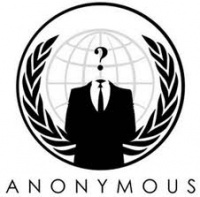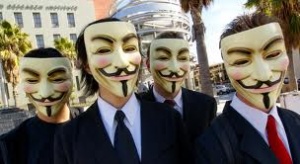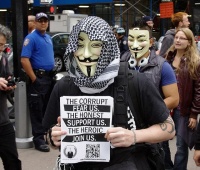Anonymous (group)
Contents
Background
Origins
Anonymous allegedly formed in 2003 in response to a YouTube video titled Dusty the Cat in which a cat was abused by a unknown boy known as Timmy (see 4chan). The group quickly and successfully determined Timmy's true identity to be Kenny Glenn. With this information, they later caused him to be arrested for his cruel actions. The group met on a specific IRC (Internet Relay Chat) channel and kept other members informed through various websites.
Anonymous was largely quiet until 2006 and 2007, when they invaded the website Habbo, a social networking service centered around the idea of a hotel, with multiple versions of the same avatar (dressed in grey with an afro) used to block other users from entering the pool area. They blocked the users on the grounds that the pool was "closed for AIDS."[2]
Anyone can summon a call to action by Anonymous by posting on various message boards, although 4chan is the most common outlet for requests. In an army without a leader mentality, anyone can join the fight. Every battle that Anonymous engages in is composed of new and different individuals, making it a revolutionary force. Consistently, however, their main motivations are for the "lolz," for fun. [3]
Notable Contributions
Attacks against the Church of Scientology
In 2008, Anonymous launched Project Chanology, a systematic attack against the Church of Scientology in response to their request for a YouTube video to be taken down [4]. The video was of Tom Cruise, an advocate for the Church of Scientology, discussing the church. The types of attacks initially included denial-of-service (DoS) attacks against Scientology websites, prank calls, and black faxes to various centers.
Take-down of Visa Payment System
Anonymous disrupted Visa payment system as an act of revenge because of Visa's refusal to handle donations to Wikileaks, an organization known for publishing secret documents. They did so by overloading the site and taking out Visa's payment processing systems, which use the same network.[3] Additionally, they launched a campaign to send multitudes of Christmas cards to Josef Fritzl in jail. Yet another contribution was uploading flashing images to an epilepsy forum in an attempt to give users seizures. [3]
Occupy Wall Street Protest
The most notable, recent, and widely spread action of Anonymous has been the Occupy Wall Street protests and the Occupy Movement. Anonymous has not received substantial media coverage in regards to this, but the protests were originally called to order by the Anonymous' twitter account and AnonNews.org, the organization's anonymous website. The protests began largely as an outcry to hold people accountable for the financial crisis which toppled the United States economy. As time passed and the movement gained momentum, their main message evolved to general discontent with the economic structure in this country and the government's general lack of effort to change it.
Anonymous has since taken a metaphorical back-seat to the action, no longer organizing the protest, but rather "live tweeting" (continuously tweeting updates about the event and what is currently happening) about it and facilitating the continued live stream of video that emanates from the parks and streets where the protesters made camp. There is a possibility that some of the live streaming video hosts are in fact members of anonymous; however, that is unconfirmed, as no identities have yet to be uncovered by some sort of counter-hacking organization.
Operation Payback
Anonymous used its traditional methods in order to attack the Motion Pictures Association of America, the Recording Industry Association of America, and their hired gun AIPLEX for their attacks against popular file sharing sites, where people can download movies and music for free. It took place during September 2010, coupled with the statement “You call it piracy, we call it freedom”. [5] Once Anonymous started carrying out their plan, the media was drawn to the story. The attention drew new members in, and Anonymous continued to swell in size. It didn’t stop here, though. The operation again resumed when MasterCard, PayPal, and the Bank of America blocked donations to WikiLeaks for releasing classified government documents. Members of Anonymous had found that these companies were allowing their services to be used by some Neo-Nazi and white supremacist groups, but wouldn’t allow their services to be used for WikiLeaks. After this, they launched yet another attack using an online tool called Low Orbit Ion Cannon. PayPal alone claimed Anonymous did seventeen million dollars of damage by shutting their site down. [6]
Take-down of Israeli Websites
In November 2012, in response to a threat made by the Israeli government to disrupt internet and telecommunications in and out of Gaza, an Anonymous member stated,
“We are ANONYMOUS and NO ONE shuts down the Internet on our watch. To the IDF and government of Israel we issue you this warning only once. Do NOT shut down the Internet into the “Occupied Territories”, and cease and desist from your terror upon the innocent people of Palestine or you will know the full and unbridled wrath of Anonymous.”[7]
Using coordinated attacks from many sources at once to overload and cause crashes of websites, Anonymous succeeded in shutting down over 600 Israeli websites. The databases of Israel Ministry of Foreign Affairs and Bank of Jerusalem were also targeted and deleted by Anonymous.[7]
Flint Water Crisis Involvement
In January 2016 Anonymous openly criticized governor Rick Snyder and released a video about the Flint water crisis. Anonymous tweeted, "remind the city officials of Flint that we do not forget and we do not forgive". They labeled this operation as #OpFlint. Within a day of making this announcement, the State of Michigan's website went down. Although it is unclear whether Anonymous was responsible for such attack, their involvement remains suspicious. [8] Shortly after, on January 21st, 2016, Flint hospital was the victim of a cyberattack. Though anonymous did not claim responsibility, they are suspected of carrying out the attack as they were responsible for attacking Boston Children's hospital in 2014. [9]
Responses to Anonymous Actions
While the anonymous factor of Anonymous evidently makes it hard to connect specific individuals with the responsibility for the actions of the group, some steps are beginning to be taken. The Digital Economy Bill will allow net users to be disconnected on suspicion of copyright infringement. Additionally, tweets by Anonymous are being taken more seriously, interpreted as threats of terrorism, and police are starting to push for the power to disconnect websites. [3]
Ethical Concerns
Anonymous has engaged in a variety of activities online such as DoS attacks, cyberbullying, and various other forms of mischief online, raising concern in both legal and ethical realms. Anonymous's ethical issues can be broken down into a variety of categories to further analyze the ethical implications of such a powerful and close guarded group. Since individuals involved in Anonymous attacks constantly change and perform sophisticated attacks, it is difficult for law enforcement to attribute and make charges against specific person(s).
Privacy Issues
Anonymous organizes many of its operations to intentionally break privacy laws and expose personal information of those who they believe have wronged the American people. For instance, in a recent attack on banking giant Goldman Sachs, Anonymous revealed the name, address, phone number, salary, and personal email address of many of the top employees, including the CEO himself. This is a clear violation of the privacy laws laid out in our country; however, the inability by the authorities to expose the source of the hack has left authorities at a dead end.
Another notable privacy issue was the case of Dusty the Cat (see above). Not only was Kenny Glenn attacked by Anonymous, with all of his personal information including home address, phone number, etc. released online, but clients of his father's business were also contacted and made aware of his son's crime of animal abuse. When Glenn tried to change his name, his new identity was also released online, forever connecting him to his act of animal abuse and the consequent internet responses. Not only will Glenn be burdened by his act for the rest of his life, but so will his family and friends.
Treatment
Individuals generally have different opinions of Anonymous, ranging from approval to hatred. By analyzing Anonymous's actions and their impact on others, many ethical issues in regards to treatment arise. Anonymous generally engages in practical jokes and/or attacks to promote a certain viewpoint or to send a message. Their impacts, whether beneficial or damaging, tend to effect a wide range of people. Whether people approve or disapprove of this group, it is clear that Anonymous' actions effect thousands of people. For example, the reference to Glenn above demonstrates Anonymous's treatment of an individual both on and offline. Some may see Glenn's punishment as suitable and fair whereas other may condemn the extent of the situation and the everlasting mark the attack has left on Glenn's name. Regardless of one's viewpoint, the main concern is who is Anonymous to determine a suitable punishment for an individuals actions (or lack there of)? How far is too far? The same questions can be asked about DoS attacks as well. Ethically speaking, their conduct and treatment towards individuals and companies is on a slippery slope because many actions in an online world can be extended into the real world as well.
Individual Action & Doxxing
While Anonymous is best known for the actions it takes against organizations or larger notorious groups as a collective, the lack of organization or regulation within the group facilitates individual action, leading to instances of "vigilante justice." This raises more questions into the legality of the actions carried out by citizens with no official training or permissions to do so simply because it is done under the name of the Anonymous group in the name of what is "right."
The prevalence of vigilante culture within the Anonymous group has to lead to some high-profile cases of Internet "doxxing," where members of Anonymous have exposed the personal information of people they consider to be their enemies such as legal names, telephone numbers, home addresses, and places of work. Recently Anonymous has focused it's doxxing efforts on issues of political and social contension. On November 5, 2015, the group launched "Operation KKK," a doxxing campaign during which they leaked the names and social media profiles of hundreds of white supremacists and their sympathizers.[10] Members involved in the dox would lead to more public discourse on racism. It is unclear how successful Operation KKK was, as many of the people identified in the data leak were "out" white supremacists--that is--they didn't hide the fact on their social media profiles. [11] Still, the question remains as to whether Anonymous was right for exposing this information.
See Also
External Links
References
- ↑ How Did Anonymous Start? The History Of The Mysterious "Hacktivist" Group Began Quite Some Time Ago
- ↑ Wired: Palin Hacker Group’s All-Time Greatest Hits
- ↑ 3.0 3.1 3.2 3.3 Manuel, Rob. "The Ragtag Army Marches to a Political Tune; Once It Was Fun That Motivated Anonymous 'hacktivists'. Now It's Attacks on Internet Freedom." 10 Dec. 2010. Web. 15 Dec. 2011.
- ↑ Singel, Ryan (January 23, 2008). "War Breaks Out Between Hackers and Scientology – There Can Be Only One". Wired CondéNet, Inc.. Retrieved December 9, 2011.
- ↑ We Are Legion: The Story of Hacktivists
- ↑ Finance Cell http://financell.com/million-dollar-damages-caused-by-anonymous-hackers/
- ↑ 7.0 7.1 http://www.washingtonpost.com/blogs/worldviews/wp/2012/11/17/anonymous-is-hacking-israeli-web-sites/
- ↑ Flint Water Crisis Update: Anonymous Hacks Michigan Website, Online Hacking Collective Says: [1]
- ↑ [Flint hospital hit with cyber attack after hacker group Anonymous promises action on water crisis:http://www.healthcareitnews.com/news/flint-hospital-hit-cyber-attack-after-hacker-group-anonymous-promises-action-water-crisis]
- ↑ https://motherboard.vice.com/en_us/article/kb7eyv/anonymous-hackers-officially-dox-hundreds-of-alleged-kkk-members
- ↑ http://bigthink.com/connected/kkk-doxing-ethics



